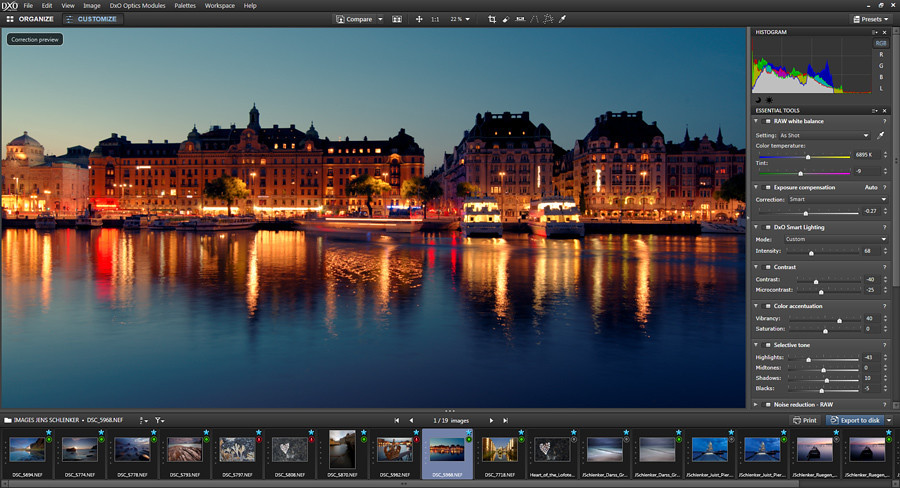
- #Dxo photolab elite how to#
- #Dxo photolab elite manual#
- #Dxo photolab elite trial#
- #Dxo photolab elite series#
No doubt you could get to the kind of sparkling clarity offered by Capture One and Lightroom, but it’s going to take a little more work. Capture One and Lightroom have Whites as well as Highlights sliders, but in PhotoLab you have an overlap between the (automatic) Smart Lighting options and the (manual) Selective Tone adjustments, but you might need both, but whichever you use, once you’ve recovered highlight detail it leaves midtones and shadows looking somewhat flattened.

Lightroom has – perhaps – a slightly nicer highlight roll-off and does keep midtones and shadows contrasty even when you use the Highlights and Whites sliders at quite high settings, but it can’t quite match Capture One’s ‘bite’. Its highlight roll-off isn’t always the best – the transition from blown detail to recoverable detail – in sky tones and clouds, for example, but it preserves midtone and shadow clarity brilliantly.
#Dxo photolab elite series#
Testing all three programs across a series of RAW files I found there was little difference in the amount of highlight detail each could recover, when pushed, but that images looked quite different afterwards.Ĭapture One was the most convincing.

PhotoLab’s shadow and highlight recover is effective, but feels very complicated compared to the others.
#Dxo photolab elite manual#
There are also manual Selective Tone adjusters for manual control but it’s not clear either how these interact with the other two.
#Dxo photolab elite how to#
PhotoLab complicates things with Exposure Compensation and Smart Lighting tools which interact to automatically optimise the image’s tonal range, but it’s not always clear what the program is doing and how to affect it manually. All three of these programs offer shadow and highlight recovery tools, but Capture One’s High Dynamic Range tools are probably the simplest and most obvious to use, though Lightroom’s shadow and highlight recovery is straightforward and effective too. One of the big reasons for shooting RAW files over JPEGs is the ability to recover blown highlights and bring up dense shadow detail. Lightroom is the only one to offer cloud sync and editing.It means paying extra for renting the online storage space needed, but there it is. Lightroom Classic can sync images up to a point, whereas Lightroom CC is built for cloud-based photography. Lightroom is the only one of the three programs here that offers cloud synchronisation and a mobile editing/capture app that works seamlessly with your desktop software. Capture One offers the greatest choice of workflows.It is not a digital asset management system in the way that Lightroom and Capture One are, but should be thought of as a powerful non-destructive processor and editor with browsing tools. PhotoLab does have basic search and album tools, but its main organisational system is folders. Lightroom and Capture One are all-in-one cataloging and non-destructive editing tools, PhotoLab is not. This is not the main point of this comparison, but let’s get this out of the way first. I will use Lightroom Classic for this comparison, but Lightroom CC (or Adobe Camera Raw) will give exactly the same results.

There are two versions of Lightroom, but they both use the same Camera Raw processing engine with the same editing tools.

If you have a Fujifilm camera, you probably have to cross PhotoLab off the list straight away – though it does support some non-X-Trans models, like the GFX 100 and X-T100. DxO’s RAW processing engine is not compatible with Fujifilm’s X-Trans sensor layout. There are no Fujifilm cameras in this comparison. What this comparison is mostly about is just how good each one of them is at processing RAW images, and to test this out I’m going to use compare the RAW image processing of files from a series different cameras, including a Canon EOS 6D Mark II, Sony A6000, Nikon Z 6 and Olympus OM-D E-M1 Mark II.
#Dxo photolab elite trial#


 0 kommentar(er)
0 kommentar(er)
